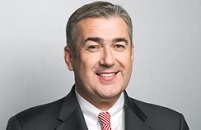Deutsche Post DHL is confident it would be able to adapt its transport provision if a ban on diesel-powered vehicles in urban areas came into effect in Germany.
Late last month, a German court ruled that cities can impose driving bans on the oldest and most polluting diesel cars, in a landmark ruling hailed as “a victory for clear air.”
Courts in Stuttgart and Dusseldorf had earlier ruled that a ban on diesel cars – of which there are around 15 million in Germany – would be effective, and should be considered.
The decision was appealed by two German states – Baden-Wuerttemberg and North Rhine-Westphalia. However, in a court ruling on February 27 the Federal Administrative Court in Leipzig approved the right for cities to implement a ban.
Asked at an annual results press conference earlier this week if the German postal and logistics group would be able to handle a situation where it could no longer operate diesel vehicles, the CEO of the Post-eCommerce-Parcel (PeP) division, Jürgen Gerdes, said:
“If certain streets, certain districts in cities became subject to a diesel ban and I think that is likely to happen, then, yes, we would be able to adjust ourselves to the situation by covering these areas with our electric vehicles on the last mile.”
Quizzed on which cities DP DHL's PeP division was currently only using electric vehicles or where it would be capable of only using electric vehicles if required, Gerdes replied:
“I'm afraid I can't give you a general answer. I think we are using around 5,500 electric vehicles and we are continuing to expand that fleet. However, I can't tell you in which cities we have already switched to electric vehicles completely.”
He added that it was his personal assessment that the division required an electric fleet of between 10,000 and 15,000 vehicles.
The press conference aso saw DP DHL quizzed on the threat posed by Amazon which has begun its own parcel deliveries in Germany and whether having such a competitor on its home turf would see it to losing business.
CEO Frank Appel gave an upbeat response, emphasising that the group had “excellent experience with e-tailers” and was helping them enhance their business.
“The e-tailers are benefiting a lot from the quality our delivery organisation. Last year, our parcel volumes increased considerably. So e-commerce is helping us and it is also helping e-tailers out there and that's why I believe we'll be very successful.”
He continued: “We are offering the best quality and our products are the most innovative and that's why we are very well-positioned. Of course, customers are trying out several things but there is a lot of customer growth out there as well. So I think customers know that we are a very reliable partner.”
The DP DHL panel of senior management executives was also asked to what extent the tight labour market in Germany could hinder the group's continued strong growth in e-commerce.
Appel said it was pleasing to see that the unemployment rate was so low in Germany because in some other European countries this was not the case. “It's posing a challenge to the companies, yes, but it's still a good development.”
Asked if DP DHL was currently experiencing any recruitment difficulties, new Human Resources chief, Thomas Ogilvie, replied:
“We've got more than 520,000 employees across the globe and we've got so many different operations in different divisions and with that we are very well-positioned as an employer of choice.
“If you look at our hub in Leipzig and at the way it is developing. Then there's also the seasonal fluctuations (in labour requirements) at peak times. Last year, we were able to demonstrate our ability to recruit as many as 20,000 employees at fairly short notice to help us out at peak times.”










